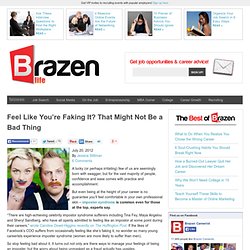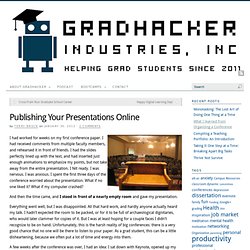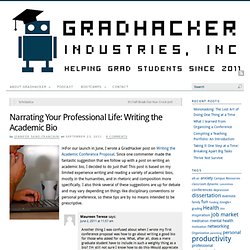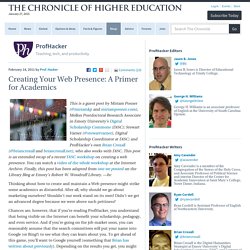

Presentations. Posters. Library.ias.edu/files/UsefulnessHarpers.pdf. Methods and Analysis. Writing and Productivity. Preparing for Promotion and Tenure. Feel Like You're Faking It? That Might Not Be a Bad Thing. 3inShare43 A lucky (or perhaps irritating) few of us are seemingly born with swagger, but for the vast majority of people, confidence and ease comes with practice and accomplishment.

But even being at the height of your career is no guarantee you’ll feel comfortable in your own professional skin – imposter syndrome is common even for those at the top, experts say. “There are high-achieving celebrity impostor syndrome sufferers including Tina Fey, Maya Angelou and Sheryl Sandberg, who have all openly admitted to feeling like an impostor at some point during their careers,” wrote Caroline Dowd-Higgins recently on The Huffington Post. If the likes of Facebook’s COO suffers from occasionally feeling like she’s faking it, no wonder so many young careerists experience imposter syndrome (women are more likely to suffer than men). So stop feeling bad about it.
Surf Your Imposter Syndrome The most immediate question for imposter syndrome sufferers is, how do I make it stop? A Badge of Honor? Publishing Your Presentations Online. I had worked for weeks on my first conference paper.

I had received comments from multiple faculty members, and rehearsed it in front of friends. I had the slides perfectly lined up with the text, and had inserted just enough animations to emphasize my points, but not take away from the entire presentation. I felt ready. I was nervous. I was anxious. And then the time came, and I stood in front of a nearly empty room and gave my presentation. Everything went well, but I was disappointed. A few weeks after the conference was over, I had an idea: I sat down with Keynote, opened up my slide show, hit the “record” button, and gave my paper again. There are a number of reasons why I think you should all consider doing the same thing with your conference papers. By having my presentations available online, I’m able to give my conference papers a second life. Earlier this month, I attended another big conference. Lastly, the recording is helpful with my own committee. Narrating Your Professional Life: Writing the Academic Bio.
For our launch in June, I wrote a GradHacker post on Writing the Academic Conference Proposal.

Since one commenter made the fantastic suggestion that we follow up with a post on writing an academic bio, I decided to do just that! This post is based on my limited experience writing and reading a variety of academic bios, mostly in the humanities, and in rhetoric and composition more specifically. I also think several of these suggestions are up for debate and may vary depending on things like disciplinary conventions or personal preference, so these tips are by no means intended to be prescriptive. Like Maureen suggests, writing an academic bio is hard. It’s a unique kind of writing that can be especially difficult for those who are new to it.
First, three big picture things to keep in mind that will pretty much always outweigh any smaller, more specific tips: context, audience, and purpose. The Barebones Bio your name,position,department,institution, andresearch interests. Creating Your Web Presence: A Primer for Academics. This is a guest post by Miriam Posner (@miriamkp and miriamposner.com), Mellon Postdoctoral Research Associate in Emory University’s Digital Scholarship Commons (DiSC); Stewart Varner (@stewartvarner), Digital Scholarship Coordinator at DiSC; and ProfHacker’s own Brian Croxall (@briancroxall and briancroxall.net), who also works with DiSC.

This post is an extended recap of a recent DiSC workshop on creating a web presence. You can watch a video of the whole workshop at the Internet Archive. Finally, this post has been adapted from one we posted on the Library Blog at Emory’s Robert W. Woodruff Library. —bc.